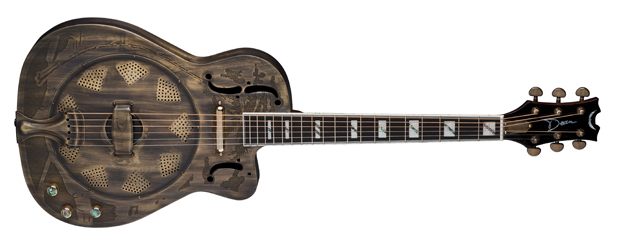Review: Dean Resonator Thin Body Electric Cutaway Guitar

The following content is related to the May 2013 issue of Guitar World. For the full range of interviews, features, tabs and more, pick up the new issue on newsstands now, or in our online store.
For most guitarists, the names Dobro and National immediately come to mind whenever resonator guitars are mentioned, but for several years Dean has built impressive resonator models that deserve more attention from fans of metal-cone guitars.
The Dean Resonator Thin Body Electric Cutaway is a versatile, innovative resonator instrument that functions equally well as an acoustic, acoustic-electric and electric guitar. With numerous upscale appointments and a street price well below $1,000, the Resonator Thin Body Electric Cutaway offers possibly the best value of any new resonator guitar available on the market today.
Features
Like Dean’s other metal-body resonator models, this guitar starts with the foundation of an iron body with a single-cone resonator and biscuit bridge. This model’s body is brass plated and features embossed palm tree graphics on the top and back. Pickups include a gold-plated lipstick-tube single-coil pickup near the neck and a piezo pickup in the bridge. Each pickup has its own volume control, and a blend control lets you adjust the balance between the electric lipstick pickup and acoustic piezo pickup tones.
The Resonator Thin Body Electric Cutaway exudes a touch of class uncommon in most guitars in its price range. The knurled gold-plated control knobs have abalone inserts, the tuners and truss-rod cover are antiqued bronze, and a multilayer binding surrounds the rosewood fingerboard, which features pearl-and-abalone block inlays. The neck has a comfortable C-shaped profile and a 24 3/4–inch scale with 19 frets, providing the playability that made Dean guitars famous in the first place.
Performance
Get The Pick Newsletter
All the latest guitar news, interviews, lessons, reviews, deals and more, direct to your inbox!
Although the body measures only two inches deep around the edges (the back is bowled to provide about another half inch of depth), the guitar produces unplugged acoustic tone and volume output similar to full-depth resonator guitars. However, the thinner depth helps eliminate feedback when the guitar is plugged in and played at full stage volume.
The piezo bridge pickup delivers natural acoustic tone through a clean amp setting, while the lipstick pickup absolutely screams when played with overdrive and distortion tones. The blend control allows you to dial in a little extra body and depth from the lipstick pickup when you’re going for an acoustic sound, or an extra boost of attack and sparkle from the piezo pickup to electric tones. Even though both pickups are routed through a single 1/4-inch output, the blend control makes it easy to go from clean acoustic sounds to blazing electric leads in an instant.
Cheat Sheet
List Price $1,192.50
Manufacturer Dean Guitars, deanguitars.com
The brass-plated iron body with a single-cone resonator and biscuit bridge provides classic acoustic resonator guitar tones.
A single-coil lipstick-tube pickup at the neck, piezo pickup in the bridge, and blend control delivers any combination of electric and acoustic-electric textures.
The Bottom Line
An exceptionally versatile resonator guitar, the Dean Resonator Thin Body Electric Cutaway works equally well as an acoustic, acoustic-electric or electric guitar with the unique character of a resonator instrument.
Since 1980, Guitar World has been the ultimate resource for guitarists. Whether you want to learn the techniques employed by your guitar heroes, read about their latest projects or simply need to know which guitar is the right one to buy, Guitar World is the place to look.
“My brother's trying to knock Norm down in price. He's worth $800 million. He goes, ‘I'll give you a bottle of whiskey on top’”: Frank Stallone on the prized vintage Epiphone that Sylvester bought him – and the guitar's mysterious origins
“More people play stop-tails than guitars with locking tremolos. We dig both”: EVH delivers on its hardtail promise and launches the Wolfgang Standard T.O.M. – which vows to take Eddie's legacy to new heights









![[from left] George Harrison with his Gretsch Country Gentleman, Norman Harris of Norman's Rare Guitars holds a gold-top Les Paul, John Fogerty with his legendary 1969 Rickenbacker](https://cdn.mos.cms.futurecdn.net/TuH3nuhn9etqjdn5sy4ntW.jpg)
